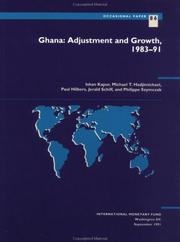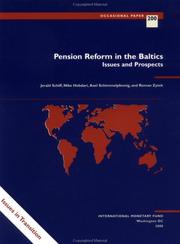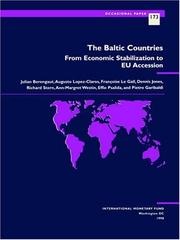| Listing 1 - 10 of 14 | << page >> |
Sort by
|
Book
Abstract | Keywords | Export | Availability | Bookmark
 Loading...
Loading...Choose an application
- Reference Manager
- EndNote
- RefWorks (Direct export to RefWorks)
ETATS-UNIS --- NONPROFIT --- FISCALITE --- STATISTIQUE --- MOTIVATION --- ETAT
Book
Abstract | Keywords | Export | Availability | Bookmark
 Loading...
Loading...Choose an application
- Reference Manager
- EndNote
- RefWorks (Direct export to RefWorks)
CONCURRENCE --- NONPROFIT --- CAPITALISME --- ETATS-UNIS --- THEORIE MICROECONOMIQUE

ISBN: 1589065689 1455219622 9786613846778 1451950179 145278969X 1283534320 9781451950175 9781452789699 9781589065680 9781455219629 9781283534321 6613846775 Year: 2006 Publisher: Washington, D.C. : International Monetary Fund,
Abstract | Keywords | Export | Availability | Bookmark
 Loading...
Loading...Choose an application
- Reference Manager
- EndNote
- RefWorks (Direct export to RefWorks)
In the past few years, India has emerged as a global economic power. It is one of the world’s fastest-growing economies, the leading outsourcing destination, and a favorite of international investors. But even with India’s impressive recent achievements, the country continues to face considerable challenges as it seeks to sustain rapid growth and extend the benefits to all its citizens. Is India entering into a "Golden Age" or experiencing a period of rapid but ultimately unsustainable growth? The studies in this book examine in detail what lies behind India’s recent economic rise and considers the steps needed to build on this success over the medium term.
331.30 --- IN / India - Inde --- Banks and banking --- -Fiscal policy --- -Textile industry --- -330.954 --- Textile industry and fabrics --- Textiles industry --- Manufacturing industries --- Tax policy --- Taxation --- Economic policy --- Finance, Public --- Agricultural banks --- Banking --- Banking industry --- Commercial banks --- Depository institutions --- Finance --- Financial institutions --- Money --- Economische toestand. --- Government policy --- India --- Economic conditions. --- Economic policy. --- Banks and banking -- India. --- Fiscal policy -- India. --- India -- Economic conditions. --- India -- Economic policy. --- Textile industry -- India. --- Fiscal policy --- Textile industry --- Business & Economics --- Economic History --- 330.954 --- Economische toestand --- Banks and Banking --- Exports and Imports --- Public Finance --- Corporate Taxation --- Macroeconomics --- Business Taxes and Subsidies --- Trade: General --- International Investment --- Long-term Capital Movements --- Taxation, Subsidies, and Revenue: General --- Banks --- Depository Institutions --- Micro Finance Institutions --- Mortgages --- Personal Income and Other Nonbusiness Taxes and Subsidies --- Public finance & taxation --- International economics --- Corporate & business tax --- Foreign direct investment --- Corporate income tax --- Income and capital gains taxes --- Exports --- Personal income --- Balance of payments --- Taxes --- International trade --- National accounts --- Income tax --- Investments, Foreign --- Corporations --- Foreign exchange
Book
ISBN: 1462362192 1455225231 1281088919 1455292729 9786613774378 Year: 1993 Publisher: Washington, D.C. : International Monetary Fund,
Abstract | Keywords | Export | Availability | Bookmark
 Loading...
Loading...Choose an application
- Reference Manager
- EndNote
- RefWorks (Direct export to RefWorks)
The IMF MULTIMOD model is used to trace the economic impact of a 20 percent reduction in world military expenditures. GDP falls in the short run, however private consumption and investment rise, leading to an increase in GDP in the medium and long run. The estimated gains to economic welfare are substantial, particularly for developing countries, although most of these gains are realized in the long run. A positive international economic externality is found to exist, implying that for any given country the economic gains from a coordinated reduction in military expenditures exceed the gains from a unilateral reduction.
Exports and Imports --- Macroeconomics --- Public Finance --- National Security and War --- Macroeconomics: Consumption --- Saving --- Wealth --- National Government Expenditures and Related Policies: General --- Trade: General --- Macroeconomic Aspects of International Trade and Finance: Forecasting and Simulation --- Public finance & taxation --- International economics --- Defense spending --- Consumption --- Expenditure --- Private consumption --- Imports --- National accounts --- International trade --- Expenditures, Public --- Economics --- United States
Book
ISBN: 1462324789 1455200042 1281600288 1455242314 9786613780973 Year: 1996 Publisher: Washington, D.C. : International Monetary Fund,
Abstract | Keywords | Export | Availability | Bookmark
 Loading...
Loading...Choose an application
- Reference Manager
- EndNote
- RefWorks (Direct export to RefWorks)
The decline in military spending that began in the mid-1980s continued through 1995, and this decline was widespread both geographically and by level of development. Cuts in military spending appear to have potentially important implications for nonmilitary spending and fiscal adjustment. In contrast to findings for previous periods, military spending has declined more than proportionately in those countries that have reduced total spending. Countries with Fund programs have reduced military spending more sharply than other developing countries, largely reflecting outcomes in the transition economies. Further, military spending appears to have been less resilient in program countries than other developing countries.
Macroeconomics --- Public Finance --- Structure and Scope of Government: General --- National Government Expenditures and Related Policies: General --- National Security and War --- Debt --- Debt Management --- Sovereign Debt --- Fiscal Policy --- Public finance & taxation --- Defense spending --- Total expenditures --- Government debt management --- Fiscal consolidation --- Expenditure --- Public financial management (PFM) --- Fiscal policy --- Expenditures, Public --- Debts, Public --- Russian Federation

ISBN: 155775182X 1462385516 1452753008 9781557751829 Year: 1991 Volume: 86 Publisher: Washington, D.C. : International Monetary Fund,
Abstract | Keywords | Export | Availability | Bookmark
 Loading...
Loading...Choose an application
- Reference Manager
- EndNote
- RefWorks (Direct export to RefWorks)
The first sub-Saharan African country to pursue broad economic and structural reform - aided by external finance and technical aid - Ghana is an example of adjustment with growth. Ghana's experience, discussed in this paper, illustrates the need for complementary policy actions and the right sequencing and speed of reforms.
Economic conditions. Economic development --- Ghana --- Structural adjustment (Economic policy) --- Ajustement structurel (Economie) --- -GH / Ghana --- 338.340 --- 339.115 --- 338.8 --- 331.30 --- 331.33 --- 331.32 --- 338 --- (667) --- $?$91/12 --- 330.35 <667> --- 338.9667009048 --- 330.05 --- Algemene ontwikkeling in de Derde Wereld. --- Buitenlandse schuld. Debt Equity Swap in LDC. --- Economische groei. --- Economische toestand. --- Structureel beleid. Reglementering. Dereglementering. Ordnungspolitik. --- Structuur van de economie. --- Economische groei. Kwantitatieve toename. Technische vooruitgang --zie ook {338.09}--Ghana --- Working papers --- 330.35 <667> Economische groei. Kwantitatieve toename. Technische vooruitgang --zie ook {338.09}--Ghana --- GH / Ghana --- Economische toestand --- Structuur van de economie --- Structureel beleid. Reglementering. Dereglementering. Ordnungspolitik --- Algemene ontwikkeling in de Derde Wereld --- Economische groei --- Buitenlandse schuld. Debt Equity Swap in LDC --- Structural adjustment (Economic policy) - Ghana --- Banks and Banking --- Foreign Exchange --- Inflation --- Macroeconomics --- Public Finance --- Finance: General --- National Government Expenditures and Related Policies: General --- Price Level --- Deflation --- Banks --- Depository Institutions --- Micro Finance Institutions --- Mortgages --- National Government Expenditures and Related Policies: Infrastructures --- Other Public Investment and Capital Stock --- Taxation, Subsidies, and Revenue: General --- Currency --- Foreign exchange --- Public finance & taxation --- Banking --- Finance --- International economics --- Exchange rates --- Expenditure --- Revenue administration --- Prices --- Exchange rate arrangements --- Expenditures, Public --- Banks and banking --- Revenue --- Fiscal policy

ISBN: 1462305792 1452715017 1557759685 9781557759689 Year: 2001 Volume: 200 Publisher: Washington, D.C. : International Monetary Fund,
Abstract | Keywords | Export | Availability | Bookmark
 Loading...
Loading...Choose an application
- Reference Manager
- EndNote
- RefWorks (Direct export to RefWorks)
This paper provides an overview of efforts in the Baltic countries to reform their pension systems, and examines the choices facing these countries in their continued reform efforts. Early reforms were aimed at correcting the flaws of the inherited Soviet system and, in particular, at shoring up the finances of the pension systems and reducing their distortionary impact. The Baltic countries have been in the forefront of transition economies in their pursuit of pension reform. They have taken important steps to shore up the long-run financial health of their existing pension funds and made preparations for the implementation of a three-pillar scheme. Although a move toward a fully funded pension system can potentially make an important contribution to the objectives of pension reform, such a change is neither necessary nor sufficient to meet these goals. The existing PAYG pension system can, at least in theory, be made sustainable by an appropriate adjustment of payroll tax rates and expected lifetime pension benefits, although the average replacement rate implied by such changes may well be fairly low, reflecting the expected demographic developments.
Baltic Area --- Baltic States --- Balkanlanden --- pays balkaniques --- politique gouvernementale --- 331.25209479 --- Retirement pensions --- Superannuation --- Retirement income --- Annuities --- Social security individual investment accounts --- Vested benefits --- balkanlanden --- overheidsbeleid --- -Baltic Republics --- Baltics (States) --- Social security law --- Pensions --- Social policy --- Social policy. --- 330.05 --- assurances --- pension --- pensioenen --- Compensation --- Pension plans --- verzekeringen --- pensioen --- Baltic Republics --- Pensions - Baltic States --- Baltic States - Social policy --- Exports and Imports --- Labor --- Macroeconomics --- Public Finance --- Demography --- Social Security and Public Pensions --- Nonwage Labor Costs and Benefits --- Private Pensions --- Economics of the Elderly --- Economics of the Handicapped --- Non-labor Market Discrimination --- Retirement --- Retirement Policies --- Wages, Compensation, and Labor Costs: General --- Labour --- income economics --- Population & demography --- Public finance & taxation --- International economics --- Pension spending --- Pension reform --- Aging --- Expenditure --- Population and demographics --- Population aging --- Wages --- Labor economics --- Latvia, Republic of
Book
ISBN: 9781484352205 1484352203 1498324681 9781498324687 9781498302333 1498302335 1484341244 Year: 2015 Publisher: Washington, D.C. : International Monetary Fund,
Abstract | Keywords | Export | Availability | Bookmark
 Loading...
Loading...Choose an application
- Reference Manager
- EndNote
- RefWorks (Direct export to RefWorks)
Japan’s revitalization plan, dubbed the “three arrows of Abenomics,” devises a three-pronged strategy—combining fiscal, monetary, and structural policies—to overcome that country’s apparent inability to sustain economic recovery. This book is the first comprehensive assessment of Abenomics and the reforms needed to make it a success, including aggressive monetary easing, growth-friendly fiscal consolidation, and structural and financial sector reforms.
Stagnation (Economics) --- Deflation (Finance) --- Disinflation --- Finance --- Economic stagnation --- Stationary state (Economics) --- Steady-state economics --- Economics --- Japan --- Economic conditions --- E-books
Book
ISBN: 1462397387 1452767408 1281602728 1451897006 9786613783417 Year: 1999 Publisher: Washington, D.C. : International Monetary Fund,
Abstract | Keywords | Export | Availability | Bookmark
 Loading...
Loading...Choose an application
- Reference Manager
- EndNote
- RefWorks (Direct export to RefWorks)
The end of the Cold War has ushered in significant changes in worldwide military spending. This paper finds that the easing of (1) international tensions, (2) regional tensions, and (3) the existence of IMF-supported programs are related to lower military spending and a higher share of nonmilitary spending in total government outlays. These factors account for up to 66 percent, 26 percent, and 11 percent of the decline in military spending, respectively. Furthermore, fiscal adjustment has implied a larger cut in military spending of countries with IMF-supported programs.
Econometrics --- Exports and Imports --- Public Finance --- Structure and Scope of Government: General --- National Government Expenditures and Related Policies: General --- National Security and War --- Estimation --- Current Account Adjustment --- Short-term Capital Movements --- Public finance & taxation --- Econometrics & economic statistics --- International economics --- Defense spending --- Expenditure --- Total expenditures --- Estimation techniques --- Current account surpluses --- Econometric analysis --- Balance of payments --- Expenditures, Public --- Econometric models --- United States


ISBN: 1557757380 1462358268 1452726779 9781557757388 Year: 1998 Volume: 173 Publisher: Washington, D.C. : International Monetary Fund,
Abstract | Keywords | Export | Availability | Bookmark
 Loading...
Loading...Choose an application
- Reference Manager
- EndNote
- RefWorks (Direct export to RefWorks)
Are the three Baltic countries, Latvia, Estonia, and Lithuania, ready for accession to the European Union? Have their economies overcome the problems of transition? The answers to these questions and their implications for policy are provided in this collection of analyses. Rather than a country-by-country description, the volume provides a cross-country perspective of developments from 1994 through mid-1997. The seven sections of this paper discuss recent macroeconomic and structural policies, exchange rate regimes, fiscal issues, financial systems, private sector development, and accession to the European Union.
Economic policy and planning (general) --- European Union --- Baltic Area --- Baltic States --- Economic conditions --- Economic policy --- Fiscal policy --- -Monetary policy --- -Structural adjustment (Economic policy) --- Economic stabilization --- -Foreign exchange --- -338 <474> --- banken --- economische situatie --- fiscaliteit --- monetair beleid --- Oost-Europa --- cooperation economique --- developpement economique --- pays balkaniques --- union europeenne --- EE / Estonia - Estland - Estonie --- LT / Lithuania - Litouwen - Lituanie --- LV / Latvia - Letland - Lettonie --- 333.101 --- 334.153.0 --- 331.30 --- 305.2 --- 336.401 --- 333.451.6 --- 330.05 --- 330.9479 --- Cambistry --- Currency exchange --- Exchange, Foreign --- Foreign currency --- Foreign exchange problem --- Foreign money --- Forex --- FX (Finance) --- International exchange --- International finance --- Currency crises --- Adjustment, Economic --- Business stabilization --- Economic adjustment --- Stabilization, Economic --- Monetary management --- Currency boards --- Money supply --- Tax policy --- Taxation --- Finance, Public --- Economische situatie. Economische structuur van bepaalde landen en gebieden. Economische geografie. Economische produktie.economische produkten. Economische diensten--Baltische Republieken --- economische samenwerking --- economische ontwikkeling --- balkanlanden --- europese unie --- Banksysteem en bankstelsel. --- Betrekkingen tussen de Europese Gemeenschappen en de geassocieerde of derde landen: algemeenheden. --- Economische toestand. --- Statistieken van de conjunctuur. --- Verband tussen begrotingspolitiek en economische evolutie. --- Vlottende wisselkoersen. Crawling peg. --- Government policy --- -Baltic States --- -Baltic Republics --- Baltics (States) --- Working papers --- -Economic conditions --- 338 <474> Economische situatie. Economische structuur van bepaalde landen en gebieden. Economische geografie. Economische produktie.economische produkten. Economische diensten--Baltische Republieken --- 338 <474> --- Statistieken van de conjunctuur --- Economische toestand --- Banksysteem en bankstelsel --- Vlottende wisselkoersen. Crawling peg --- Betrekkingen tussen de Europese Gemeenschappen en de geassocieerde of derde landen: algemeenheden --- Verband tussen begrotingspolitiek en economische evolutie --- Baltic Republics --- Economic conditions. --- Economic policy. --- Baltic States - Economic conditions --- Baltic States - Economic policy --- Banks and Banking --- Budgeting --- Foreign Exchange --- Macroeconomics --- Public Finance --- Banks --- Depository Institutions --- Micro Finance Institutions --- Mortgages --- National Government Expenditures and Related Policies: General --- Comparison of Public and Private Enterprises and Nonprofit Institutions --- Privatization --- Contracting Out --- National Budget --- Budget Systems --- Banking --- Public finance & taxation --- Currency --- Foreign exchange --- Finance --- Expenditure --- Budget planning and preparation --- Commercial banks --- Financial institutions --- Economic sectors --- Exchange rate arrangements --- Public financial management (PFM) --- Banks and banking --- Expenditures, Public --- Pensions --- Lithuania, Republic of
| Listing 1 - 10 of 14 | << page >> |
Sort by
|

 Search
Search Feedback
Feedback About
About Help
Help News
News